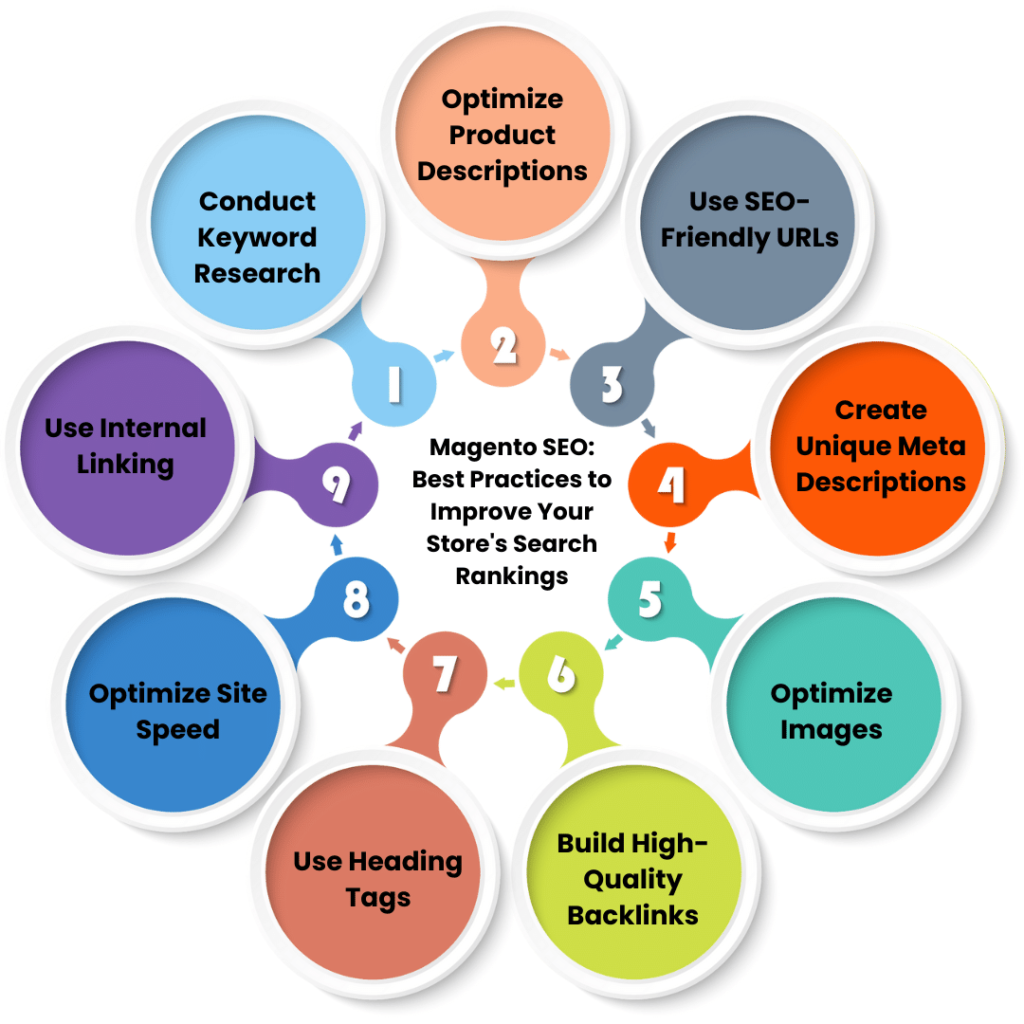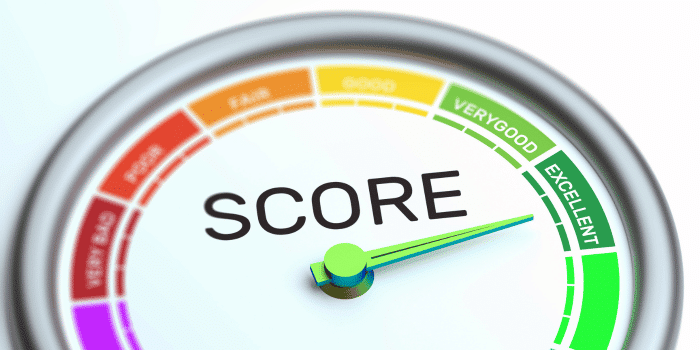Introduction
Running an online store in today’s competitive e-commerce landscape can be a challenging task. With so many players vying for the attention of potential customers, it’s essential to take every step to enhance the visibility of your Magento store. One of the most effective ways is Magento SEO.
Magento is a popular e-commerce platform that offers a wide range of customization options to help you build a unique online store. However, with so many customization options, it can be challenging to know where to begin when it comes to optimizing your store’s SEO. That’s why we’ve put together this comprehensive guide on the best Magento SEO practices to improve your store’s search rankings and boost your online visibility.
Magento SEO: Best Practices to Improve Your Store’s Search Rankings
Conduct Keyword Research
The first step in any successful SEO strategy is to conduct thorough keyword research. This involves identifying the keywords and phrases that potential customers are using to search for products in your niche. Once you have a list of relevant keywords, you can use them to optimize your store’s content, including product descriptions, category pages, and blog posts.
Pro Tip: Use keyword research tools like Google Keyword Planner or SEMrush to identify the most relevant and high-volume keywords for your store.
Improve your Magento store’s visibility and attract more customers with our expert SEO services. Contact us today!
Optimize Product Descriptions
Product descriptions are a crucial component of your store’s SEO. Not only do they provide essential information about your products, but they also offer an opportunity to include relevant keywords and phrases. When optimizing your product descriptions, make sure to:
- Include the product name and relevant keywords in the title and meta description
- Write unique, informative, and engaging product descriptions
- Use bullet points to make the information easy to read
- Include high-quality product images and videos
Pro Tip: Use long-tail keywords in your product descriptions to target more specific search queries and attract highly relevant traffic.
Use SEO-Friendly URLs
URLs play a significant role in your store’s SEO. Make sure to create SEO-friendly URLs that include relevant keywords and are easy to read and remember. Avoid using long, complicated URLs that include irrelevant information. Instead, use simple and descriptive URLs that accurately reflect the content on the page.
Pro Tip: Use hyphens to separate words in your URLs, as search engines recognize hyphens as word separators.
 Create Unique Meta Descriptions
Create Unique Meta Descriptions
Meta descriptions are the brief snippets of text that appear beneath your store’s URL in search results. These descriptions offer an opportunity to entice potential customers to click through to your store. When creating meta descriptions, make sure to:
- Include relevant keywords
- Write unique, informative, and compelling descriptions that accurately reflect the content on the page
- Keep the descriptions between 150-160 characters to ensure they’re not truncated in search results
Pro Tip: Use action-oriented language in your meta descriptions to encourage clicks, such as “Shop Now” or “Learn More.”
Optimize Images
Images are an essential component of your store’s visual appeal, but they can also impact your store’s SEO. When optimizing your images, make sure to:
- Use descriptive file names that include relevant keywords
- Compress images to improve page load speed
- Use alt tags to describe the image content for accessibility and SEO purposes
Pro Tip: Use high-quality images to enhance your store’s visual appeal and engage potential customers.
Don’t let your competitors outrank you in search results. Let us optimize your Magento store’s SEO and boost its visibility.
Build High-Quality Backlinks
Backlinks are links from other websites that point to your store. They are a crucial component of your store’s SEO, as search engines see them as a sign of credibility and authority. To build high-quality backlinks, consider:
- Reaching out to relevant bloggers or influencers in your niche and offering to guest post or collaborate
- Creating informative and shareable content that others will want to link to
- Engaging in social media and online communities to share your content and build relationships
Pro Tip: Monitor your backlink profile regularly to ensure that you’re only getting high-quality links and not spammy or irrelevant ones.
Use Heading Tags
Heading tags (H1, H2, H3, etc.) are a way to structure your content and indicate the importance of different sections. When using heading tags, make sure to:
- Use only one H1 tag per page and make sure it includes relevant keywords
- Use H2 and H3 tags to structure subheadings and break up content
- Use descriptive and concise headings that accurately reflect the content on the page
Pro Tip: Use heading tags to create a clear and organized structure for your content that is easy to navigate for both users and search engines.
Optimize Site Speed
Site speed is a critical factor in your store’s SEO, as search engines favor fast-loading websites. To optimize your site speed, consider:
- Minimizing the use of large images or videos
- Enabling browser caching and compressing files
- Using a content delivery network (CDN) to distribute content and reduce server load
Pro Tip: Use Google Page Speed Insights or GTmetrix to test your site speed and identify areas for improvement.
Use Internal Linking
Internal linking is the practice of linking to other pages on your website. This can help to:
- Improve navigation and user experience
- Distribute link equity throughout your site
- Encourage users to explore related content on your site
When using internal linking, make sure to:
- Use descriptive anchor text that accurately reflects the content on the linked page
- Avoid excessive linking or linking to irrelevant pages
- Prioritize linking to high-value pages, such as your homepage or top-selling products
Pro Tip: Use a site map or navigation menu to make it easy for users to find and navigate to important pages on your site.
Are you struggling to get your Magento store noticed online? Our SEO services can help! Reach out to us now to learn more.
FAQs
Q: What is Magento SEO?
A: Magento SEO is the practice of optimizing your Magento store to improve its search rankings and visibility in search engine results pages (SERPs). This means that by optimizing your store’s content, structure, and performance, you can ensure that it appears at the top of relevant search results and is easily discoverable by potential customers.
Search engines like Google use complex algorithms to determine which websites appear at the top of search results for particular queries. By following Magento SEO best practices, you can help search engines to understand what your store is about and how it can best serve users’ needs. This, in turn, can help to improve your store’s visibility, attract more traffic, and ultimately increase sales and revenue.
Magento SEO involves a wide range of factors, including on-page optimization, off-page optimization, technical optimization, and more. By addressing these factors and implementing best practices, you can ensure that your store is well-structured, well-optimized, and well-received by both search engines and potential customers.
Some of the key factors to consider when optimizing your Magento store for SEO include choosing relevant keywords, creating high-quality content, building high-quality backlinks, using heading tags, optimizing site speed, and using internal linking. By focusing on these areas and making continuous improvements, you can help to improve your store’s search rankings and attract more customers to your business.
Q: Why is Magento SEO important?
A: Magento SEO is important because it helps to improve your store’s visibility and attract more customers. By optimizing your store’s content, structure, and performance, you can ensure that it appears at the top of relevant search results and is easily discoverable by potential customers. Let’s take a closer look at why Magento SEO is so important and how it can benefit your business.
Increased Visibility
The primary goal of Magento SEO is to increase the visibility of your store in search engine results pages (SERPs). This means that when potential customers search for keywords related to your products or services, your store appears at the top of the search results. By appearing at the top of relevant search results, your store is more likely to be discovered by potential customers who are actively searching for what you offer. This can help to drive more traffic to your store and increase your chances of making sales.
Get More Traffic by implementing proper Magento SEO techniques
By increasing your store’s visibility in search results, Magento SEO can also help to drive more traffic to your store. When your store appears at the top of relevant search results, it is more likely to be clicked on by potential customers. This increased click-through rate can lead to more traffic to your store, which in turn can lead to more sales and revenue.
Better User Experience
In addition to increasing your store’s visibility and driving more traffic, Magento SEO can also help to improve the user experience of your website. By optimizing your site’s structure and performance, you can make it easier for potential customers to find what they are looking for and navigate your site. This can help to reduce bounce rates and increase engagement, which can ultimately lead to more conversions and sales.
Competitive Advantage with Better Magento SEO
Finally, Magento SEO can give you a competitive advantage over other businesses in your industry. By optimizing your store for search engines, you can ensure that it appears at the top of relevant search results, even when competing against larger or more established businesses. This can help to level the playing field and give smaller businesses a better chance of competing and succeeding in their industry.
Magento SEO is essential for any business that wants to increase its online visibility, attract more customers, and succeed in today’s competitive digital landscape. By implementing Magento SEO best practices and continuously improving your store’s performance, you can ensure that your business is well positioned to succeed and thrive.
Q: What are some common Magento SEO mistakes to avoid?
A: While Magento SEO can be incredibly effective when done correctly, there are several common mistakes that businesses should avoid when optimizing their store for search engines. Let’s take a look at some of the most common Magento SEO mistakes and how to avoid them.
Keyword Stuffing
One of the most common Magento SEO mistakes is keyword stuffing, which involves using excessive amounts of keywords on a single page or throughout your store. While it may be tempting to cram as many keywords as possible into your content, this can actually hurt your search rankings and make your store appear spammy.
To avoid keyword stuffing, focus on using relevant keywords naturally throughout your content. Use variations of your target keywords and focus on providing high-quality, informative content that serves the needs of your customers.
Duplicate Content
Another common Magento SEO mistake is using duplicate content across your store. This can happen when you copy and paste content from one page to another or use the same content across multiple pages.
Duplicate content can hurt your search rankings by confusing search engines and causing them to prioritize other pages over yours. To avoid this mistake, make sure that all of your content is unique and provides value to your customers. Use canonical tags to indicate the preferred version of a page and avoid duplicating content.
Neglecting Mobile Optimization can drastically affect Magento SEO
With more and more customers using mobile devices to browse the internet, neglecting mobile optimization can be a major Magento SEO mistake. If your store is not optimized for mobile devices, you may be missing out on a large portion of potential customers.
To avoid this mistake, make sure that your store is mobile-friendly and optimized for a range of devices and screen sizes. Use responsive design to ensure that your store looks great on any device and make sure that your content is easy to read and navigate on a small screen.
Ignoring User Experience can harm Magento SEO
Finally, ignoring user experience can be a major Magento SEO mistake. Even if your store is well-optimized for search engines, if it provides poor user experience, potential customers may quickly leave and never return.
To avoid this mistake, focus on providing a high-quality user experience throughout your store. Make sure that your store is easy to navigate and use, with clear calls to action and a streamlined checkout process. Optimize your site speed and minimize loading times to provide a fast, responsive experience for your customers.
By avoiding these common Magento SEO mistakes and focusing on best practices, you can ensure that your store is well-optimized for search engines and provides a high-quality user experience for your customers. By continuously improving your store’s performance and monitoring.
Conclusion
Optimizing your Magento store’s SEO is a crucial step in improving its visibility and attracting more customers. By following these best practices, you can ensure that your store is well-structured, well-optimized, and well-received by search engines and potential customers alike. Remember, SEO is an ongoing process, so make sure to monitor your store’s performance regularly and make adjustments as needed to stay ahead of the competition.
If you want to take your Magento store’s online visibility to the next level, our SEO services are the answer. Get in touch with us today!







